Eagle Battalion Cadets Stand Out in Military Summer Programs
EIGHT CADETS EARN COVETED RECONDO BADGE
Eight Georgia Southern cadets were awarded the hard-won RECONnaissance and commanDO or RECONDO badge for displaying superior skills at Advanced Camp. Held at Ft. Knox, Kentucky, the monthlong training tests, develops and evaluates cadets’ leadership skills, physical fitness and academic achievement. Ka’Leah Davis is one of the cadets who performed exceptionally well at Advanced Camp. Georgia Southern magazine asked the senior exercise major about the experience.
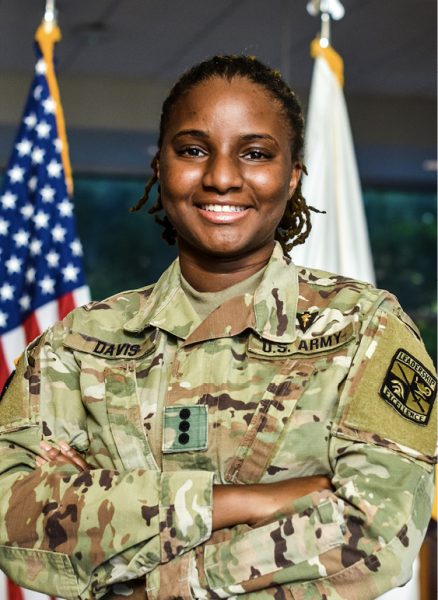
Ka’Leah Davis: Griffin, Georgia
What was most rewarding about this endeavor?
The most rewarding thing about this summer training was going through graduation, being announced as the number one female within my platoon, receiving RECONDO and truly realizing that this was one of the last hurdles that I had to jump over to become an Army Officer. I feel extremely overwhelmed with gratitude as I prepare to graduate and commission in May of 2022.
How will this training help you in the future?
This training allowed me to reflect on my leadership attributes and recognize where I could continue to grow and improve. This experience, thus far, has also allowed me to prepare the cadets who will be attending Advanced Camp next summer, allowing them to feel more comfortable and capable of excelling.
Why did you choose to attend Georgia Southern University?
After having to leave the United States Military Academy due to being medically disqualified, I chose Georgia Southern because of the accessibility at the time. However, I chose to remain at Georgia Southern because of the “home feeling,” and because I earned a three-year Army ROTC scholarship and received a medical waiver from the Eagle Battalion. Georgia Southern University essentially gave me a second chance at becoming an Army Officer.
FIVE CADETS EARN THEIR WINGS
Congratulations to Cadets Jasper Brun, Jacob Dease, Tim Johnson, Carson McClellan and Solomon Sidwell for successfully completing U.S. Army Air Assault School. Brun and Johnson trained at Ft. Campbell, Kentucky, and Dease, McClellan and Sidwell participated in training at West Point in New York. The 10-day course is highly selective and mentally and physically demanding. It ends with a grueling 12-mile foot march and upon completion, soldiers earn the Air Assault Badge. Eagle Battalion Cadet Tim Johnson is pursuing a master’s degree in political science. Georgia Southern magazine asked him about his experience at Air Assault School.
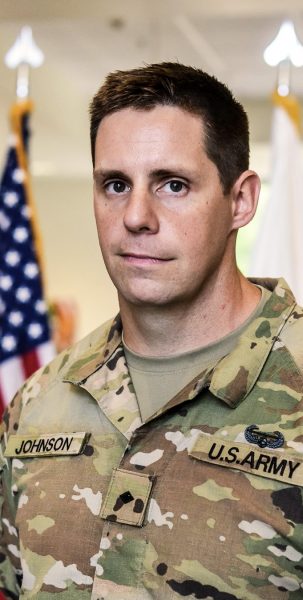
Tim Johnson, BSN, RN, CCRN-CSC: Savannah, Georgia
What was the most challenging aspect of the training?
The fast pace of the course. It is a lot of information crammed into a short window of time. Time management is key and knowing how to focus on what’s important.
Describe a typical day’s training at Air Assault School.
Air Assault School is broken down into three phases. The school overall is tasked with developing skills to conduct Air Assault Operations. That means being able to hook up various types of equipment ranging from cargo boxes, Humvees, trailers, fuel blivets or water containers to the bottom of aircraft to be able to move them through terrain that vehicles may have a more difficult time navigating through.
The first phase is aircraft. We are given in detail all the potential helicopter aircraft you might hook loads up to. There is a must-pass test at the end of each phase. The second phase is sling loads. Generally viewed as the most difficult phase, it shows us how to properly rig the various loads. We are given six pieces of equipment and then test four of them to check for deficiencies. We have two minutes to go through each load and find three out of four deficiencies that can make these rigged loads too dangerous to fly. The third phase is rappelling. We are taught how to hand tie a Swiss seat rappel harness with a piece of rope and complete the tie in 90 seconds or less. Then we rappel off an open-sided 60-foot tower to prepare us for the final day when we rappel out of a UH-60 Blackhawk helicopter hovering in flight. The final day is a 12-mile road march to earn your Air Assault wings.
Why did you choose to attend Georgia Southern University?
I wanted to come back closer to home after living in Florida and North Carolina for the last eight years and traveling up and down the East Coast as a travel nurse. Georgia Southern has one of the most competitive ROTC programs with a lot of additional opportunities for training that you can participate in before commissioning.
What do you appreciate most about ROTC at Georgia Southern?
I appreciate the ability to grow as a leader but also the ability to fail as a leader. They do not hold your hand and give you all the answers. They know you are going to make mistakes but the question is how you will adapt and grow from those mistakes. They ask a lot of us, but we are all willing to take on that challenge knowing that we will be leading America’s sons and daughters, often in places that are dangerous and unforgiving. They always tell us this is our program, and we will determine how successful it will be.
SUCCESS AT CADET TROOP LEADER TRAINING
Students selected for Cadet Troop Leader Training (CTLT) are embedded in actual Army units for three to four weeks to observe a day-in-the-life of a lieutenant leading a platoon. Cadets Eunbin Bak, Yasmin Camacho, Elizabeth Carpenter, Hannah Farnsworth, Teagan Fisher, Hunter Kight, Thomas (Banks) Massey and Jamie Reed were assigned to different military bases to put their leadership skills into practice. Camacho, a senior, is majoring in Modern Language and will be the third Camacho sister to commission from the Eagle Battalion. During her training, she successfully completed the Spur Ride, earned her spurs and was inducted into the Order of the Spur. The Spur Ride is a cavalry tradition in which soldiers must demonstrate their mastery of various skills and exercises. Georgia Southern magazine asked her about job shadow experience at Vilseck, Germany, RSS 2nd Cavalry Regiment.
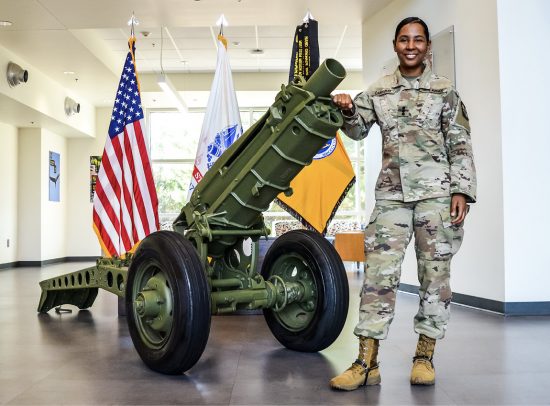
Yasmin Camacho: Statesboro, Georgia
Why did you pursue this opportunity?
It gave me the opportunity to learn and to see how brand new officers interact with their soldiers and to see what are the duties and responsibilities of a new officer when she/he first goes to a unit.
Describe a typical day’s training in your program?
Waking up at 5:30 a.m. for daily PT [physical training], checking emails and having morning meetings to prioritize the tasks of the day, walking back and forward in the motor pool checking trucks and vehicles and going to officers’ meetings to gain a better understanding of future missions.
What was the most difficult aspect of the training?
Leading others with much more time and experience than myself.
How will this training help you in the future?
It will help me because I have a better understanding about the difference between a good leader and a bad leader, and how my actions and decisions can affect others.
What was most rewarding about this summer training endeavor?
The amazing people I had the chance to meet and work with, and everything I learned about the U.S. Army.
How would you describe this experience overall?
The experience was amazing. It taught me that I don’t have to be perfect. I learned that it is okay to make mistakes because we will learn from them.
CADETS COMPLETE SUMMER INTERNSHIPS
Internships give students a chance to use their leadership, research, technical or language skills while seeing what their military career will look like once they commission into the U.S. Army. Cadets Miara Elmore, Emily Espinoza, Philip Folkerts, George Khairi and Robert Moreland participated in internships that tapped into their specialized training. Moreland is a senior information systems major, who completed an internship at Ft. Belvoir, Virginia. Georgia Southern magazine asked him about his experience there.
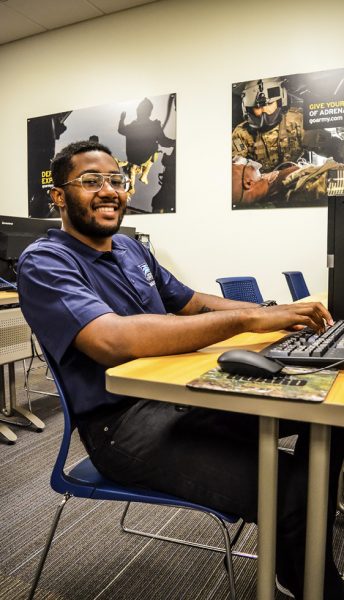
Robert Moreland: Fayetteville, Georgia
Why did you pursue this opportunity?
I really like technology and the challenge new technology provides. Given these current times, more attacks are happening on a device than in-person.
Describe a typical day’s training in your program?
There are not many typical days working on the prototyping side of the Army. There are meetings and testing that are done every day. There were times specific individuals needed to see a demo of a product. The demos can include numerous iterations of entering and clearing a building.
How will this training help you in the future?
This has helped me understand where I am in my foundation of knowledge in the IT/computer science landscape.
What was the most challenging aspect of the training?
Coding in a language I had never used before.
What was most rewarding about this internship?
The massive opportunity for self-development. Also, the ability to see a side of the Army that is not talked about for security reasons.
What do you appreciate most about ROTC at Georgia Southern?
Graduating is a team effort. If a cadet reaches out and asks for help, numerous people will come running to help.
Are you a busy college student?
I am busy. I take 14 credit hours and I am a part of the key leadership for Eagle Battalion. I also do intramurals and I try to find good avenues to build generational wealth.
ROTC STUDENTS PREPARE TO LEAD
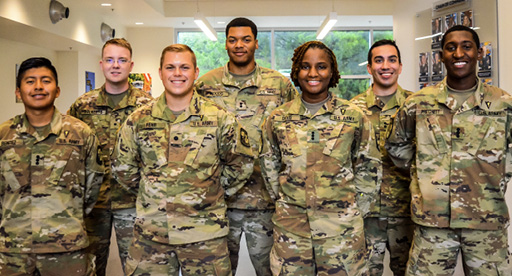
The Georgia Southern Army ROTC program excels at producing cadets who perform well physically and academically. Before they can commission into the U.S. Army as a second lieutenant, they must show proficiency in a number of areas. This past summer, more than 80 students participated in some tough specialized training at Army facilities across the United States and overseas. The standouts received special recognition for what they accomplished.
REAL-WORLD TRAINING FOR NURSING STUDENTS
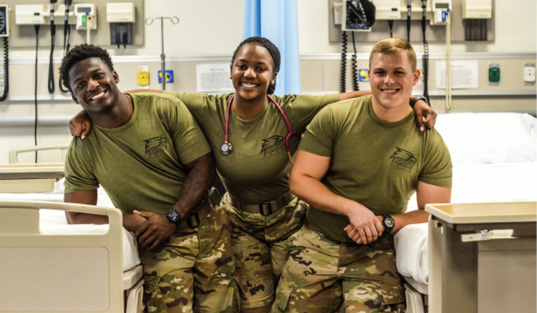
Cadets Gavin Fehr, Mya Forbes, Shakireah Gibbons, Mikel McCann, Brandon Vuong, Kanika Waters and Jared Wells were selected for the Nurse Summer Training Program (NSTP). Each trained at different Army hospitals across the U.S. under the direct supervision of an experienced Army Nurse Corps officer. During the four-week NSTP, the students honed their clinical and professional skills while learning more about the roles and responsibilities of an Army Nurse Corps officer. Walter Reed National Military Medical Center in Bethesda, Maryland, and Tripler Army Medical Center in Honolulu, Hawaii, were among the hospitals where the cadets participated in NSTP.
